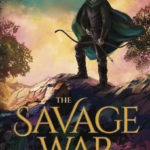Meet The Parents
 Parents take many different forms in literature. From Mrs. Weasley, warm and nurturing, to Darth Vader, who gives hugs via Force Choke. However, there’s been a quiet trend, at least in some of the popular fiction I’ve read, of parents who are killed off or written as weak and flaky. This seems to be an attempt to accelerate the maturity of the young protagonists—but does it? I find I lose interest when the ignorance of the parents serves only to increase the so-called worthiness of the main character. It’s like giving the protagonist a sign that says, “Look at me! I’m so legit because I’ve risen above those narrow-minded fuddy-duddies with the negative attitudes!” It feels like we haven’t graduated from 7th grade.
Parents take many different forms in literature. From Mrs. Weasley, warm and nurturing, to Darth Vader, who gives hugs via Force Choke. However, there’s been a quiet trend, at least in some of the popular fiction I’ve read, of parents who are killed off or written as weak and flaky. This seems to be an attempt to accelerate the maturity of the young protagonists—but does it? I find I lose interest when the ignorance of the parents serves only to increase the so-called worthiness of the main character. It’s like giving the protagonist a sign that says, “Look at me! I’m so legit because I’ve risen above those narrow-minded fuddy-duddies with the negative attitudes!” It feels like we haven’t graduated from 7th grade.
Real life, instead, has proven that who we are is who we are, and if we want to be someone different, it’s more complicated than severing ties with our parents. How we are raised is powerful. That example of when everyone comes home for the holidays is common for a reason. We all tend to slip back into our “place” that we occupied when we were younger. I go back to being the people-pleasing youngest child, even though I am a competent mother in my “real life.”
As fiction writers, we want to draw readers into our new worlds with a string of reality that will help our audience accept our character who has blue hair and six arms. So we strive to create a real person, with real struggles and characteristics. And a struggle with or against how the characters were raised is a natural way to do that.
Parents aren’t always the adversaries—always writing them as such is an easy way out. We are cheating our readers—and ourselves—if we never explore our character’s relationship with their parents. They deserve more than an existence as two-dimensional antagonists.
 All parents have a direct influence (positive and negative). Biological parents engrave traits that are written in DNA. When I’m reading and see this inherited aspect, it helps me connect with the characters. We connect with Luke Skywalker because he has this innate desire to be like his father—as many of us do. We see that he has skill with the Force and he is good at making things, like his father. And even when his father is revealed to be Luke’s opponent, he goes further, hoping to change that relationship. This creates another dimension of Luke, allowing us to see how the Jedi training has brought him from a boy to a man who handles his power differently than his father.
All parents have a direct influence (positive and negative). Biological parents engrave traits that are written in DNA. When I’m reading and see this inherited aspect, it helps me connect with the characters. We connect with Luke Skywalker because he has this innate desire to be like his father—as many of us do. We see that he has skill with the Force and he is good at making things, like his father. And even when his father is revealed to be Luke’s opponent, he goes further, hoping to change that relationship. This creates another dimension of Luke, allowing us to see how the Jedi training has brought him from a boy to a man who handles his power differently than his father.
Having a character struggle against his natural urges and win is an effective way to build a believable person, and also encourage readers.
We can also explore the dynamic effect that death has upon children. How do parents influence a child, even if they’re not physically present? Just watch your social media feed on Mother’s Day weekend—it is proof that whether or not people have their parents in their lives, they are affected. On that basis our fictional characters should be affected, too. Harry Potter wanted to find out as much about his parents as possible—and probably got more than he bargained for. He is repeatedly told how he is like his father. Harry is even treated differently because of his parents’ actions. Yet this strengthens the bond Harry feels with his parents.
Have your character find out during her journey that her parents weren’t who she thought they were. Allow that to either make or break the bond she feels with them.
Then there are the relationships that are truly destructive. Physical, verbal, and emotional abuse will always damage a relationship far beyond what humans can repair. But even that is an area that readers and writers may benefit by digging into. Seek out the reason for the abuser’s viciousness. Seek a healing for the person who is hurt. Forgiveness is a powerful story. One that we all benefit hearing about in a realistic way.
Write real mother-daughter/father-son relationships. Don’t just use the parental units as pawns to tick off your protagonist. Well, yes, use them to do that, but then go deeper. Explore it. Go into those uncomfortable places none of us want to go when we must confront people who are able to wound us to the core. Heal or break the relationship further.
Why go to that trouble? Because it is real. And in the midst of elves and superheroes and dragons, that thread of reality will keep your reader turning the page.
– – – – –
 Amy Davis is a writer, mother, lover of hot drinks and nerdy things. She is one of the founding members of Crosshair Press—an indie publisher—serves as the Acquisitions Manager, and blogs on that site monthly. She occasionally tweets on Twitter.
Amy Davis is a writer, mother, lover of hot drinks and nerdy things. She is one of the founding members of Crosshair Press—an indie publisher—serves as the Acquisitions Manager, and blogs on that site monthly. She occasionally tweets on Twitter.










































My protagonist is in a situation similar to Harry’s where he is constantly searching for more info about his deceased parents, and people are always comparing him to his dad. In his case it adds a lot of pressure because his parent was a famous and very successful military captain. People recognize him wherever he goes because he looks a lot like his dad, so he can’t escape the comparison. Ultimately it drives him to be better and more ambitious, in his attempts to live up to his father’s legacy. But his likeness to his dad also lands him in the sights of enemies who would like nothing better than to crush him in vengeance against his father…those are the enemy antagonists, but I should play with that theme a little more on the “good” side too! Surely not everyone loved and revered his father! And it would also be neat to explore how striving to be like his dad could push him to overestimate himself and get cocky about his success, and the fallout that could occur from that. Very interesting idea…
Thanks for the thought-provoking article! 🙂
Bethany,
I love that you’re using the death of your protagonist’s parents to help him grow and find out more about himself! It sounds like you’ve got great ideas for expanding on that. I’m glad you found the article helpful.
I’ve read plenty of how-to books that recommend killing off the parents so the kid has to stand on their own. That’s why certain father-figures in Harry Potter had to die–in the end, Harry had to stand alone.
That said, I think parents are a great point of conflict, especially in older YA/NA. In my Spacetime books, Carda has a helicopter mother and a father who keeps secrets. Indal’s parents are divorced, but battle each other by giving him costly gifts to sway his loyalty one way or the other. There’s never been an unhappier spoiled rich kid.
Alternatively, in Malevolent, my paranormal romance, Libby’s parents are loving and supportive Christians who nurture her through a bad boyfriend and breakup, then try fruitlessly to warn her away from Mal (who of course is a nice guy under his scary monstrous exterior).
Kessie,
I definitely agree that having a character’s parents/parent figures meet an untimely demise can be necessary to progress a character. Too often, I think, authors don’t use the deaths to strengthen their characters in a plausible way. I know there are mixed reviews on JK Rowling’s writing style, but that is one thing I believe she handled well in HP.
The parent relationships you’ve listed sound fascinating. Good for you for not shying away from addressing real-life issues in other worlds!
Love this article! One of the things people have commented about my writing is that I never ignore the parents. I love the way it grounds fantastical stories. I understand how they can seem to “get in the way” but it really can add such depth to character, and allow for interesting plot twists!
My heroine’s parents live in another country, but are definitely a part of her and her brother’s lives (yup, she has a sibling, they have a decent relationship, and they’re room-mates). It’s cultural for her race to live in large family compounds–but at the start of the story, the distance is due to a political scandal. She has some issues connecting with her parents and family because a mysterious injury robbed her of her memories, which is a fun tension to play with. They remember all of these intimate family details, and she doesn’t, so she feels left out. Then, spoilers, her memories slowly get restored, and that adds a nice healing subplot to the main story.
Janeen,
Thanks for your comment. Your plot sounds really interesting. I’m glad you decided to add those family details that make the story resound with readers!
FABULOUS post, Ms. Davis! I’ve noticed this trend too. There are so many orphaned protagonists out there, and even the ones that aren’t seldom have a strong family bond.
I’m planning the rewrites of book 2 in the fantasy series I’m working on, and this version will include a lot more family struggles. Circumstances prevented my two teenaged MCs from telling their parents what was going on in book 1 (mainly the fact that they were traveling to another world to save it), but in this book . . . *rubs hands* They tell their parents, and tension abounds! There’s so much opportunity for conflict and, eventually, healing. 🙂
Tracey,
Appreciate the comment! Isn’t tension fun? At least when I’m writing it. 😉 Hope the rewrite goes well!
I don’t think it makes sense to call it a trend since I’m pretty sure the pattern of poor/non-existent parent characters has been around since the first books with young protagonists. Even Newbery classics suffer from this sometimes. It’s just the easiest way to focus all the attention of the choices of the child/teen.
That said, I agree with everything else in this article. 🙂 Write real relationships!
Leanna,
Fair enough. 🙂 I mostly meant in the books I’ve picked up recently, but you’re correct. It’s an easy method for focusing on the young protagonist. Thank you for reading!